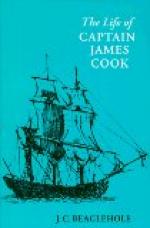“I rather think they are places of retreat or strongholds, where they defend themselves against the attack of an enemy, as some of them seem’d not ill design’d for that purpose.”
British soldiers have since discovered that a Maori Pah is “not ill designed for that purpose.” Cook most unfortunately missed the Harbour of Tauranga, the only safe port on the east coast between Auckland and Wellington for ships of any size.
Native account.
In what is now known as Cook’s Bay, they managed to induce the natives to trade, and purchased crayfish, over which Parkinson waxes enthusiastic, and “Mackerell as good as ever was eat,” the latter in such large quantities that they were able to salt a considerable number, thus saving their sea stores. After an observation of a transit of Mercury, in which they were not very successful (Wharton thinks they were taken by surprise, the transit occurring somewhat earlier than expected; Green says: “Unfortunately for the seamen, their look-out was on the wrong side of the sun. The end was likewise as grossly mistaken"), they returned to the ship and found that there had been a difficulty with the natives, who had assumed a very threatening manner, and one attempted to run off with a piece of calico which was at that time a subject of barter. Mr. Gore seized a musket and fired, killing his man. Colonel Mundy, in Our Antipodes, says he saw a man named Taniwha, in 1848, who remembered Cook’s visit, and imitated his walk, with the peculiar manner he had of waving his right hand, and also told of the kindly way Cook had with the children. Taniwha told Mundy that after the man was shot, the Maoris landed, consulted over the body, and decided that as the corpse “commenced the quarrel by the theft of the calico, his death should not be revenged, but that he should be buried in the cloth which he had paid for with his life.” Colonel Wynyard took down the same story from Taniwha’s lips in 1852, when he was supposed to be about ninety-three, and says: “His faculties were little impaired, and his great age perceptible more from a stoop and grey hairs than any other infirmity.” Cook expressed very strong disapproval of Mr. Gore’s conduct.
Next day Cook and Banks explored a river that entered near where they were anchored, the east side of which was very barren, but the west was much better, no signs of cultivation showing on either. Wild fowl were plentiful, and oysters, “as good as ever came from Colchester,” and of about the same size, says Banks, were taken on board in large quantities:




